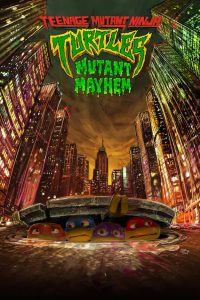“And My Axe!”: Josh Pearce and Arley Sorg Discuss The Green Knight
 It’s not often one sees the theatrical release of a 700-year-old poem, and just as rarely is there a modern adaptation of an Arthurian myth that does not involve either the Sword in the Stone or the Holy Grail. The Green Knight (or, as it calls itself onscreen, Sir Gawain and the Green Knight by Anonymous) is about Arthur’s (Sean Harris) nephew Gawain (Dev Patel), who embarks on a quest to confront a mysterious challenger (Ralph Ineson) and achieve glory and honor.
It’s not often one sees the theatrical release of a 700-year-old poem, and just as rarely is there a modern adaptation of an Arthurian myth that does not involve either the Sword in the Stone or the Holy Grail. The Green Knight (or, as it calls itself onscreen, Sir Gawain and the Green Knight by Anonymous) is about Arthur’s (Sean Harris) nephew Gawain (Dev Patel), who embarks on a quest to confront a mysterious challenger (Ralph Ineson) and achieve glory and honor.
All the major set pieces from the poem are included, but the original text skips over many of Gawain’s adventures, leaving plenty of gaps for writer/director/editor David Lowery to insert his own interpretations, themes, and supplementary material.
Josh: I loved this movie. I thought it was gorgeous and weird, and it’s my favorite movie I’ve seen this year (so far).
Arley: I solidly really liked the first half, and I thought that they made good use of the unexpected in a way which still makes sense. Those kind of little details go far to making a subject like this, which has been done to death, feel fresh.
Josh: I enjoyed that this is a story of these knights going up against the Green Man. It could almost be a meta-commentary on the Christian version of Arthur versus the pagan version of Arthur — you know, how he’s so strongly associated with the Holy Grail now, when in the original Welsh sequence he was this demon-spawn who just went around plundering Annwn.
Arley: It’s kind of esoteric, in the sense that if you don’t already know something about this subject matter, it will seriously impair your ability to enjoy this movie.
Josh: It’s very academic. Unless you’ve studied the Green Knight poem like in a class or something, you’re not gonna know a bunch of the details, but I understood what was happening in the storyline. Mostly. I didn’t understand what that opening scene was all about, with the burning building and the two people escaping.*
Arley: Even though I didn’t completely understand it or get what was going on, that opening scene – in the moment of watching it – still set up theme and character for me: shit is burning, people are screaming and dying, meanwhile Gawain is off getting laid! But yeah, people could write papers about individual scenes. I think that even though I feel like I got the gist of the film and I got a lot of things about it and I got a lot of what it was trying to do, I feel like there’s a shit ton of stuff that I’m just not going to get because I don’t have the knowledge base.
Josh: This is a very subjective movie so it’s gonna be really hard for us to land anywhere in agreement on anything. We can spend hours arguing minutiae and our audience will just completely take something else from it.
There is very little on-screen combat in this knights tale — no extended sword fighting, no epic Lord of the Rings battle scenes. It is a fever-dream character study that replaces the original story’s theme of honesty with one of courage (though true honesty takes courage, as well) and finds room in the negative spaces for giants, talking foxes, and an encounter with Saint Winifred.
Assiduous artistic choices appear almost at once, with a dialogue-free introduction to Gawain’s character reliant on clever camera work (note the water drops synchronized to the beat of the film’s score), and a rapid-fire opening title that mix-and-matches fonts with later intertitles. Several sequences appear to be shot using only natural light, and, of course, the use of color is central to the visual storytelling — not just green, but also blue, red, and gold.
It’s a long movie, over two hours, and slow, and meditative, but as there is always something on the screen that demands careful attention, it tips over into hypnotic.
Arley: I thought the cinematography was really great. Lots of lovely shots, lots of interesting shots, some brilliant moments. The aerial shot when Gawain lops off the Green Knight’s head stands out, with a splotch of red off-center in a circle, reminds me of more artistic anime and probably hearkens back to some famous director film studies folks can cite. The shot when Gawain is leaving home: pulled out at first, with him on the far left, but ultimately sweeping in to a tight shot on his face. Some of the scenes in the woods. The shot of the ravaged woodlands, before these. So many more!
Josh: If you’re not in the mood for that kind of long, drawn-out story you’re gonna get bored really fast. You’ve got to be really interested in what’s going on, not necessarily in what people are saying on screen, but on everything around it. When Gawain’s riding out from Camelot, I noticed it was a matte painting, and it looked incredible! I love when films use these old-school effects. That said, I was a little disappointed at how CGI the fox looked, but I realize it’s probably impossible to train an actual fox, especially when it’s supposed to be a magical talking animal. And later on, they digitally alter the Green Knight’s face to look like several of the other actors’ — it’s very quick, very subtle, a good example of how CGI can aid in storytelling.
Arley: The giants looked really cool. Such a stoner moment. He literally eats mushrooms right before that, and then asks them for directions.
Josh: Yeah, that scene was great. It felt like a Terry Gilliam movie.
Arley: There were a few moments in here that reminded me of Eyes Wide Shut, in that off-beat, weird way: the sense of, “wait, what?!?” I think the first one was when the Green Knight walks out, and Gawain is standing there really awkward, and I had this feeling of damn you just got schooled son, you in too deep but then all the knights stand and applaud, as if the meaning of what just happened is completely different for them than it is for both me and Gawain.
How to avoid an anti-climatic resolution when at least one combatant is unkillable, and when literature nerds everywhere already know the ending to the story? Lowery balances staying true to the source material and maintaining tension all the way to the conclusion by using surreal, time-twisting imagery. The ending is set up by earlier scenes, but it will have varying degrees of success with viewers. It’s weird, but weird for a reason.
Josh: The Saint Winifred scene was one of my favorites.
Arley: Mine too. I liked how he said, “Are you a ghost?” and she’s like, “What are you doing, don’t touch me.”
Josh: Yeah, he asked, “Are you a spirit, or are you real?” and her answer was, “What’s the difference?” Sums up so much about this worldbuilding.
Arley: She sends him on this mini-quest. He has a moment of hesitation, but she corrects him and then he’s like, fuck it, this is the right thing to do, and dives into the water in the dark. So it’s like he’s not a total coward, but he’s definitely struggling to find his own sense of heroism. And I love how that sequence kind of unpacks that struggle and gives him a moment to shine — it’s not too strong of a moment, it’s not a full character transformation, but it shows that he does have the potential.
Josh: You didn’t like the ending.
Arley: Correct. It didn’t work for me. For one thing, I thought it was just too long for what it was doing, and I wasn’t prepared for it. It’s so important to have that expectation going in. And part of it is also that for me it undermines the point of him making a decision.
Josh: It was definitely a risky choice, to do the ending that way. When they started going into it, I was thinking, “Oh no, is this how it’s going to end? Is this going to retroactively ruin my entire experience of the rest of the movie?” But they had to do something that wasn’t a cop out, and I think they balanced that really well. I was on board with it. Those are the kinds of movies I like — when you finish it, you have a satisfactory feeling of having watched it, even if you didn’t fully understand everything. Then it requires repeat viewing or more research, allowing the audience to figure things out without feeling cheated. But, you know, other people will probably hate it.
Arley: I do agree that that whole segment was some great storytelling because they did it all without dialogue and they said everything they needed to say just with moving pieces.
Josh: I’ve only seen one other movie by this director, A Ghost Story, which has a lot of time lapse, and characters crossing the screen repeatedly to show the seasons passing. So Lowery has a really interesting sense of depicting time on film, especially without using dialogue, and I was probably already prepared for where The Green Knight was going because of that.
As befits a movie featuring a Green Man, there is an overt environmental message. While Gawain rides out from Camelot, he passes a deforested area from where woodcutters supply the great city its timber and fuel, and the humankind vs. nature theme is later reinforced in a monologue delivered by one of Alicia Vikander’s characters.
Arley: Excellent use of Shakespearean soliloquy.
In the same way, there is also a critique of violence — of violence against nature, against women, against entire populations, as well as an examination of colonialism, Christianity, and cultural imperialism. In the film, Arthur claims to have brought peace to this kingdom, yet Gawain rides through a battlefield of corpses where the king is said to have killed 960 men singlehandedly. And by so much blood was the chivalric tradition maintained.
Unlike previous film versions of “Sir Gawain and the Green Knight”, this one features people of color in lead or significant roles. As Bridgerton did last year, The Green Knight diversifies an English story that would previously be primarily (or entirely) cast with white actors, and does so without explanation or calling it out as exceptional. It simply, quietly, resets the default.
Arley: This movie was interrogating the whole idea of quest-based stories. There’s a moment where somebody asks him, “So that’s all you have to do, just this one thing, and you get all this glory?” With a tiny “you know how dumb that sounds?” smirk. I felt like it’s highlighting how these ideas of honor are sort of stupid in ways (there’s a quote or two about isn’t good good enough), but also how being a person who lives up to some kind of ideal is not simplistic, and it’s not a matter of like, let me go do a b & c real quick, and then I’m done and I’m a hero. I even like when they first show Arthur and Guinevere because they’re not super pretty. They just look haggard, as if ruling has weighed on them, and the choices they made along the way came with a cost. These people who are idealized as heroes are also murderers who just went around killing people.
Josh: Dev Patel is an extremely beautiful man, which is a good thing because a lot of this film is just him wandering around in the rain by himself. All the performances were great. Even actors I don’t normally like in other roles — Joel Edgerton, Sean Harris, Erin Kellyman — they were perfect casting choices in this, in their cadence and carriage. Special shout-out to Alicia Vikander doubling as Essel and The Lady.
A film that’s the product of a singular vision isn’t guaranteed to have mass appeal — this isn’t Transformers, or The Avengers — but at the very least it doesn’t suffer from being written by committee. There is the risk that the writer (and/or director) can run to self-indulgence, or that their particular, idiosyncratic worldview will wind up alienating the audience, but The Green Knight leaves enough ambiguity in there for viewers to read their own interpretations of this enduring myth.
In any case, it’s refreshing to see someone putting artistic effort and care into a movie these days, with attentive thought in the small details that no one would usually care about.
Arley: I think it’s an incredible movie that’s doing a lot of shit in a really skillful way. In a sense, we don’t even have the space to properly cover it here. So yeah, I don’t totally know if I liked it, mostly because of the ending, but I think it’s really cool. In an era of rehash after remake after reimagining, this film stands out as remarkable. It should be watched, but go with the right mood; calibrate expectations.
Josh: You can appreciate it for the craftsmanship and artistry, and still not like it, that’s totally legit. A24 releases a lot of movies that no one else is doing, the weird, artsy ones with conspicuous color palettes and people catching on fire. I like it.
The Green Knight might not strike the right chord with everybody, but it’s easily the best Arthurian adaptation of this century, stretching back from 2017’s King Arthur: Legend of the Sword to the 2004 King Arthur with Clive Owen. It’s one for the history books.
*[Josh: Update, I figured it out. The first line of the original poem is: “After the siege and the assault of Troy, when the city was burned to ashes, the knight who therein wrought treason was tried for his treachery and was found to be the truest on Earth.” The first two characters listed in the credits of the movie (in order of appearance) are Helen and Paris.]
Written and directed by: David Lowery
Starring: Dev Patel, Alicia Vikander, Sarita Choudhury, Sean Harris, Kate Dickie, Ralph Ineson, Barry Keoghan, Erin Kellyman & Joel Edgerton

ARLEY SORG, Senior Editor, grew up in England, Hawaii, and Colorado. He lives in Oakland, CA. A 2014 Odyssey Writing Workshop graduate, Arley is co-Editor-in-Chief at Fantasy Magazine, Associate Editor and reviewer at Lightspeed & Nightmare magazines, columnist for The Magazine of Fantasy and Science Fiction, and interviewer at Clarkesworld Magazine. He can be found at arleysorg.com – where he has started his own “casual interview” series with authors and editors – and on Twitter (@arleysorg).
JOSH PEARCE has stories and poetry in Analog, Asimov’s, Beneath Ceaseless Skies, Cast of Wonders, Clarkesworld, IGMS, Nature, and more. Find him on Twitter: @fictionaljosh, or at fictionaljosh.com. One time, Ken Jennings signed his chest.
 While you are here, please take a moment to support Locus with a one-time or recurring donation. We rely on reader donations to keep the magazine and site going, and would like to keep the site paywall free, but WE NEED YOUR FINANCIAL SUPPORT to continue quality coverage of the science fiction and fantasy field.
While you are here, please take a moment to support Locus with a one-time or recurring donation. We rely on reader donations to keep the magazine and site going, and would like to keep the site paywall free, but WE NEED YOUR FINANCIAL SUPPORT to continue quality coverage of the science fiction and fantasy field.
©Locus Magazine. Copyrighted material may not be republished without permission of LSFF.








